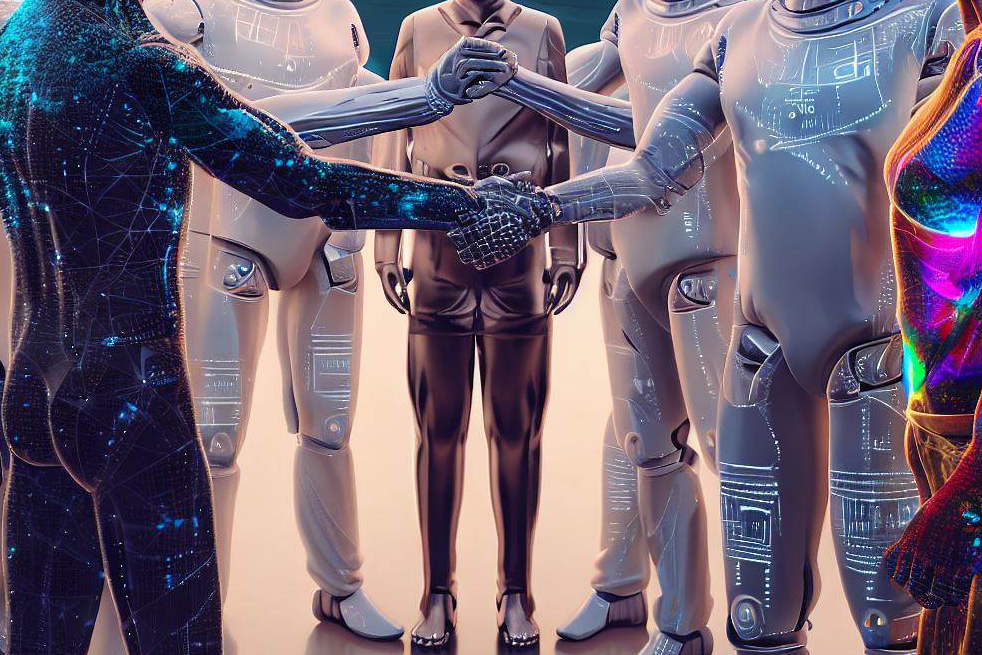The concept of transhumanism has been around since the early 20th century, but it is only recently that it has gained significant attention. Transhumanism refers to the use of science and technology to enhance human abilities beyond what is considered normal or natural.
It encompasses a broad range of areas, including
- biotechnology,
- nanotechnology,
- cognitive science
- and artificial intelligence.
The growing interest in transhumanism is driven by the belief that it has the potential to improve human life in ways previously thought impossible.
Transhumanism raises important questions about ethics, morality, and the nature of humanity itself. As technology advances and we move closer towards realizing transhumanist goals such as immortality or super-intelligence, we must consider not only the potential benefits that these advancements can bring but also the risks they pose.
Definition of Transhumanism

At its core, transhumanism is a philosophy that embraces the idea that humans can and should use technology to enhance our physical, psychological, and intellectual capacities. This could involve anything from using gene editing to eliminate hereditary diseases to developing artificial intelligence that can augment our decision-making processes.
While there is no single agreed-upon definition of transhumanism, it often involves a rejection of traditional notions about what it means to be human. Proponents argue that we should not be bound by our biology or limited by the constraints of evolution – instead, we should actively shape our own destiny through technological progress.
Brief History of Transhumanism

The roots of transhumanist thought can be traced back to ancient times – for example, Greek mythology features stories about humans who were granted superhuman abilities by the gods. However, modern transhumanism as a distinct movement emerged in the late 20th century.
One key figure in this movement was philosopher Max More, who founded the Extropy Institute in 1990 as a place for like-minded individuals to explore the potential for human enhancement. Other important thinkers in this space include Ray Kurzweil (who popularized the idea of a “singularity” where humans merge with machines) and Nick Bostrom (who has written extensively about existential risks associated with advanced technologies).
Importance of Transhumanism
Transhumanism represents a significant departure from traditional ideas about what it means to be human, and as such, it has the potential to reshape society in profound ways. From a geopolitical perspective, the race for technological advancement could lead to new power dynamics between nations as some become more dominant in certain areas (such as biotechnology or artificial intelligence).
There are also concerns about how these technologies could be used in warfare and espionage. On a more personal level, transhumanist technologies have the potential to dramatically improve the quality of life for individuals – for example, by allowing people with disabilities to overcome their limitations or by extending their lifespan.
However, there are also ethical questions about who should have access to these technologies and how they should be regulated. Ultimately, the impact of transhumanism on global society will depend on how we navigate these complex issues in the years ahead.
The Global Impact of Transhumanism on Geopolitics
The Race for Technological Advancement and its Impact on Global Power Dynamics

The potential for growth in transhumanist technologies has sparked a new race among countries to achieve technological advancements and dominate the global arena. The geopolitical implications of this race are complex, as countries not only compete with each other but also form alliances to maintain their power.
From artificial intelligence (AI) to biotechnology, every technological advancement promises significant benefits over others, be it in economic development or military power. For instance, China’s Belt and Road Initiative aims to build infrastructure across Asia, Europe, and Africa – an effort that will undoubtedly enhance China’s global economic leverage.
In addition, China is investing heavily in AI technology research and development – an area where the U.S. is currently leading. The competition between these two nations over AI technologies could determine the next world superpower.
The Potential for a New Arms Race in Biotechnology and Artificial Intelligence
Transhumanist technologies have immense potential to revolutionize warfare capabilities, giving rise to a potential arms race in biotechnology and artificial intelligence. With developments such as cyborg enhancements or mind-machine interfaces that can increase soldiers’ physical abilities or decision-making speed, transhumanist technologies offer significant advantages over traditional warfare methods. However, this arms race raises concerns about ethical implications, such as how much humanity should be changed before we consider ourselves post-human?
Additionally, there is the question of how far individual rights will transform alongside these changes? It’s crucial that governments reflect on these ethical questions before embracing transhumanist technologies in their armed forces.
The Ethical Implications of Using Transhumanist Technologies in Warfare

Transhumanism holds great promise but also poses serious ethical conundrums regarding how far humans should be enhanced technologically before they fundamentally lose their humanity. For example, with the cybernetic implants, the question arises as to what extent can a soldier keep their individuality when they have implanted tactical information or sensory enhancement devices?
Moreover, since such enhancements will undoubtedly be costly, this raises questions around access and social inequalities.
Another critical issue is the use of AI in warfare.
With AI-enabled autonomous weapons or drones that can make decisions on their own, there is the potential that they may act without human intervention. As such decisions could be catastrophic; ethical guidelines must be established for AI’s use in warfare.
While transhumanist technologies promise immense benefits to humanity, they also pose significant challenges related to geopolitics and national security. It’s vital that all stakeholders – governments, scientists, and citizens alike – work together to ensure ethical guidelines are established for using these technologies before embracing them fully into society.
The National Security Implications of Transhumanism
The Role of Transhumanist Technologies in Enhancing National Security

Transhumanist technologies offer a range of potential benefits for national security. For example, the development of new and advanced prosthetics, implantable devices, and other medical technologies can help enhance the physical abilities of soldiers and other personnel.
This could lead to fewer casualties in combat situations, as well as improved functionality and endurance in non-combat scenarios.
The use of advanced artificial intelligence (AI) algorithms also has significant implications for national security.
For example, AI-powered surveillance systems can be used to monitor borders more effectively or track individuals for law enforcement purposes. Similarly, machine learning algorithms can be used to identify patterns that may indicate potential terrorist attacks or other threats.
Potential Threats Posed by the Use of Transhumanist Technologies by State and Non-State Actors
Despite their potential benefits, transhumanist technologies also represent a significant threat in the hands of malicious actors.
Advances in biotechnology could be leveraged by states or non-state actors—such as terrorist organizations—to create new forms of biological weapons capable of causing widespread harm.
Similarly, advances in AI have the potential to lead to fully autonomous weapons systems that are capable of making decisions about when and how to use deadly force without human input. This could pose a significant threat not just on the battlefield but also outside it—for example if such systems were hacked or malfunctioned.
The Need for International Cooperation to Regulate the Development and Use of these Technologies
Given the potentially harmful implications posed by transhumanist technologies, there is an urgent need for international cooperation on regulating them. This is particularly important given that different countries have different attitudes towards technology development and use—some may prioritize national security at all costs, while others may prioritize individual privacy rights above all else. To ensure that transhumanist technologies are used safely and responsibly, it is essential that there be international consensus on how they should be regulated.
This could involve creating new international treaties or agreements on the development and use of these technologies, or establishing new international organizations to oversee their development and deployment. Ultimately, the challenge lies in striking a balance between harnessing the potential benefits of these technologies while mitigating their potential risks to national security.
International Cooperation on Transhumanism
Current Efforts towards International Cooperation on Regulating Transhumanist Technologies

Transhumanism, with its potential to fundamentally alter the human condition, has captured the attention of governments and international organizations around the world. In recent years, there have been efforts to establish international cooperation on regulating transhumanist technologies.
One such example is the Global Future Council on Human Enhancement, formed in 2016 by the World Economic Forum.
The council brings together experts from various fields to discuss the ethical, legal, and social implications of human enhancement technologies.
The United Nations Educational, Scientific and Cultural Organization (UNESCO) is also involved in promoting international cooperation on transhumanism.
UNESCO hosted a conference in 2019 titled “The Ethics of Artificial Intelligence: Issues and Initiatives” which explored ethical concerns over AI and its potential impact on society. The conference resulted in a recommendation for countries to work together towards a global regulatory framework for AI.
Challenges to International Cooperation on this Issue

Despite these efforts towards international cooperation, there are challenges that hinder progress towards creating a global regulatory framework for transhumanist technologies. Perhaps the most significant challenge is differing cultural attitudes towards technology across nations. Some countries may view certain forms of human enhancement as acceptable, while others may view them as taboo or even immoral.
Another challenge is concern over national sovereignty and control over the research and development of these technologies. Countries may be hesitant to agree to an internationally agreed upon regulatory framework if they perceive it as infringing upon their national interests or ability to pursue their own technological advancements.
There is also disagreement among experts about what types of regulations are necessary or desirable for transhumanist technologies. Some argue that strict regulations would stifle innovation, while others suggest that a lack of regulation could potentially lead to dangerous developments.
Potential Benefits to Global Society from Increased International Cooperation on Regulating Transhumanist Technologies

Despite the challenges, there are potential benefits to global society from increased international cooperation on regulating transhumanist technologies. One such benefit is the ability to create a more level playing field for technological advancement across nations. By agreeing upon a set of regulatory standards, countries could work together towards developing human enhancement technologies that are safe and ethically sound.
Additionally, increased international cooperation could lead to greater transparency in the research and development of transhumanist technologies. This would help build trust between nations and reduce the risks of miscommunication or misunderstandings about the intentions behind certain developments.
An internationally agreed upon regulatory framework for transhumanism could help prevent unethical or dangerous uses of these technologies by state or non-state actors. In a world where national security threats can come from anywhere, ensuring that these technologies are used responsibly and for the betterment of humanity as a whole should be a top priority for all nations.
Reshaping the Future with Transhumanism
The Importance of Ongoing Dialogue and Collaboration Between Experts
As we move forward into an increasingly interconnected world, it is essential that experts from various fields come together to discuss and collaborate on issues related to transhumanism. Given the potential implications for global politics and security, it is important that policymakers are well-informed about these technologies. Likewise, scientists must be attentive to ethical considerations in their research.
The role of social scientists will be critical in the coming years, as they can help us understand how differing cultural attitudes towards technology may create barriers to international cooperation. Ultimately, ongoing dialogue will promote awareness about these important issues among policymakers, scientists, ethicists, and other experts working in diverse fields.
The Promise of Transhumanism: A Brighter Future?

While there are certainly concerns about transhumanist technologies, which must be addressed through collaboration between stakeholders across multiple disciplines — there is also great optimism for what these technologies could mean for our future. Advancements in biotechnology could help cure previously terminal diseases; enhancements through AI-assisted implants could make learning faster than ever before; and augmented reality devices could provide us with new ways of experiencing art or connecting with loved ones across vast distances.
It is our hope that we can harness this potential while ensuring that all stakeholders are represented and all potential risks are adequately addressed. By doing so, we can build a future that is brighter, more inclusive, and more equitable for all.
This is the end of my 10-part Intro / Overview into Transhumanism.
From here on in, anticipate me tackling one question each day, and doing a deeper dive into some of the nuances of what we’ve addressed in this series.
Thanks for reading!
Referenced in the above Article
Max More – He is a philosopher and futurist who is the leading advocate of the philosophy of transhumanism.
Wikipedia: Max More
Ray Kurzweil – He is an inventor, futurist, and proponent of the concept of technological singularity.
Wikipedia: Ray Kurzweil
Nick Bostrom – He is a philosopher known for his work on existential risk, the anthropic principle, human enhancement ethics, superintelligence risks, and the reversal test.
Wikipedia: Nick Bostrom
Extropy Institute – An organization that was a platform for networking, education, and research into areas of life extension, nanotechnology, etc. It was founded by Max More.
Wikipedia: Extropy Institute
Global Future Council on Human Enhancement – A part of the World Economic Forum that explores the political, economic, social and cultural contexts of health.
Website: Find more information on the World Economic Forum’s councils here:
World Economic Forum’s Global Future Councils
World Economic Forum – An international organization for public-private cooperation. The Forum engages the foremost political, business, cultural and other leaders of society to shape global, regional and industry agendas.
Website: World Economic Forum
United Nations Educational, Scientific and Cultural Organization (UNESCO) – It is a specialized agency of the United Nations aimed at promoting world peace and security through international cooperation in education, the sciences, and culture.
Website: UNESCO

C M, a seasoned editor, journalist, and consultant, is deeply fascinated by the convergence of technology, space, and the future of humanity.
With a particular interest in transhumanism, futurology, and the philosophical and ethical dimensions of these domains, C M serves as the lead contributor to TranscendSphere and SpaceSpotlight.
When not penning insightful articles on these rapidly evolving fields, C M indulges in their love for podcasts and books, proudly embracing their status as a ‘Happy Nerd Extraordinaire!’





